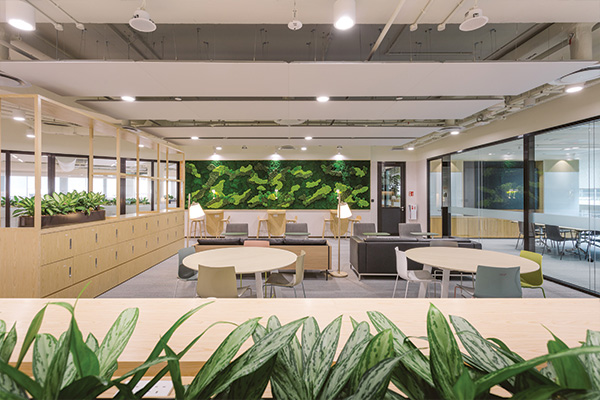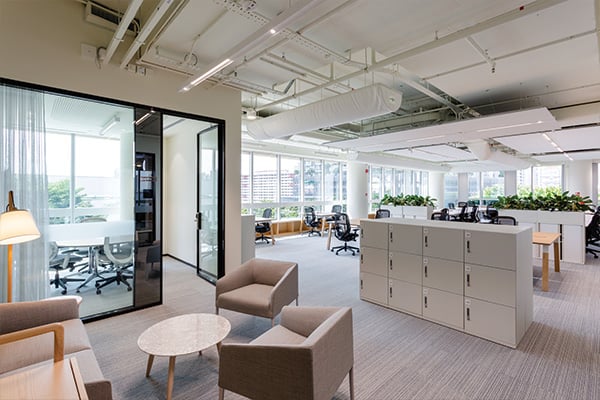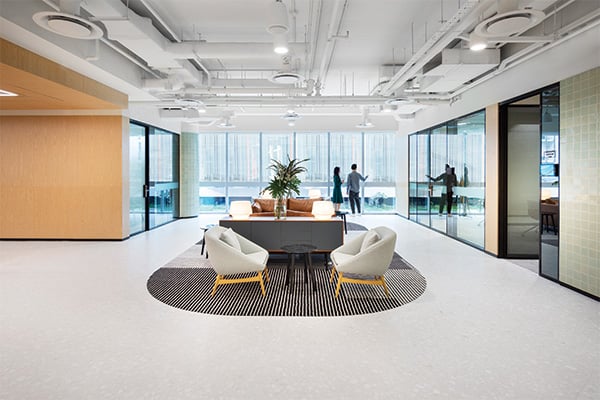We will cover:
- What Is A Flexible Shared Workplace
- How Does A Flexible Shared Workplace Differ From A Traditional Workplace
- Does Your Business Need One?
WHAT IS A FLEXIBLE SHARED WORKPLACE?
Commonly referred to as “flex space”, a flexible shared workplace can be defined as a fully serviced office that comprises of dedicated workspaces with communal amenities and furnishings available to companies and professionals via flexible lease terms. Under the umbrella of flexible workplaces sits a variety of office solutions that include hot-desking options, co-working spaces and private office suites.
There are a few core elements that govern flexible workplace trends. The best flexible shared workplaces make great use of square footage through the implementation of open plan concepts that bring together private office suites, breakout spaces, quiet zones, on-demand meeting rooms, shared resources and amenities for individuals to work in any capacity they need.
More significantly, the concept of a flexible shared workplace tends to extend beyond its physical space, creating a close-knit community built on common values, mutual trust, and synergy that comes from working alongside like-minded businesses.
HOW DOES A FLEXIBLE SHARED WORKPLACE DIFFER FROM A TRADITIONAL WORKPLACE?

1. An Improved Work Experience
The pandemic has prompted a shift to a more human-centric approach in the workplace. Repurposing the office as a space for collaboration, wellness and productivity has become more important than ever.
Thoughtful design, premium amenities, leading-edge acoustics, ergonomics, physical privacy and secure technology are just some of the elements flex space providers invest in to elevate their workplace experience. 
As demand among enterprise clients grow, more shared flexible workplaces are increasingly offering fully furnished private office suites. This gives companies the option to carve out their own dedicated space and company culture like a traditional office, but with the extra benefit of a flexible work environment.
Additionally, the opportunity to network, collaborate and innovate alongside other like-minded businesses are known to have a positive impact on overall employee motivation, attraction, and retention, resulting in significant cost savings in the long run.
2. Flexibility in Scaling
According to a study conducted by AWA, data suggests that only 48% of dedicated desk space are utilised on any given day. With a flexible shared workplace, you can expand or contract your physical footprint to fit your business needs at a moment’s notice, allowing you to make smarter space planning and investment choices.
Flexible shared workplaces also offer businesses greater latitude. In many cases, lease terms can be negotiated to last anywhere between one to five years, unlike traditional offices that typically require a minimum five-year commitment.
The ability to stay agile at different phases of your business frees you to easily scale when needed without incurring more costs associated with a traditional office long-term lease.
3. Decreased Overhead
While the security of a long-term lease and the ability to fully customise your office space may sound appealing, without robust budgeting, the hidden costs of occupancy can quickly add up. These not only include those of rent, but also the resources needed to keep the space operationally ready for employees. These include utilities, furniture, IT equipment and other necessities for a full-fledged workplace.
4. Crisis Management
In a conventional lease arrangement, crisis management falls directly on your shoulders. For example, if the Internet goes down or a pipe bursts, you may have to divert your attention from your business to restore a conducive work environment.
This can mean lost time, lost energy, and lost revenue. But when you base your business in a flexible shared workplace, infrastructure emergencies won’t distract your team from the task at hand.
In most flex space arrangements, these details are already taken care of which helps you to avoid shelling out significant capital up front, thereby reducing overall occupancy costs.
A flexible shared workplace like Csuites absorbs your operational costs at a favourable and budget-matching monthly fee, reducing the cost of overhead drastically and enabling your business to hit the ground running.
DOES YOUR BUSINESS NEED ONE?

For business owners, flexible shared workplaces offer other important benefits beyond productivity. As businesses are forced to evaluate how they lease and maximise space, adopting a flexible workplace strategy can be attractive as they provide companies with greater control and agility to stay nimble.
A flexible shared workplace can prove advantageous in the following scenarios:
- Outgrowing current office
- Setting up a satellite team, also referred to as a “hub-and-spoke” model
- Hiring seasonal or project-based employees
- Utilising temporary office space during construction or renovation
- Reducing office density to accommodate safe distancing
- Downsizing due to an increase in remote working
- Hosting an event or meeting
In times of growth and volatility, a flexible shared workplace allows your team and business to focus on what they do best, without any interruptions.
If you are re-evaluating your office space requirements, get in touch with us to learn how we can help to streamline your business operations or try out our spaces for yourself.
